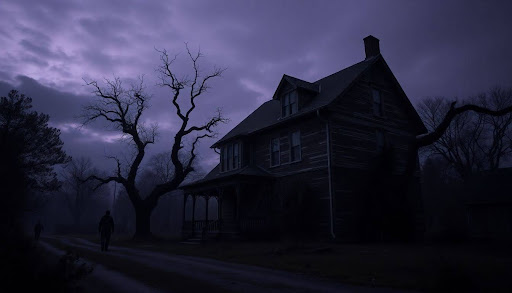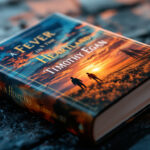You Like It Darker by Stephen King – A Riveting Collection of Short Stories
Stephen King’s You Like It Darker delivers exactly what fans expect: gripping storytelling that lingers long after the final page. This collection of twelve short stories, released in May 2024, explores haunting themes like mortality, grief, and human vulnerability—all while weaving in moments of supernatural unease. Whether you’re a long-time King enthusiast or a casual reader looking to explore his work, this collection is packed with surprises, offering both chilling suspense and emotional depth. Prepare to question what lies beneath the surface of everyday life.
Overview of You Like It Darker
Stephen King’s You Like It Darker is a collection of twelve short stories that demonstrates his unparalleled ability to explore life’s darker corners. Released in May 2024, the collection offers a mix of brand-new tales and reimagined previously published works. King doesn’t just scare—he makes readers think, question, and sometimes even feel hope in unexpected ways. Each story is a crafted glimpse into the complexities of the human condition, seamlessly interwoven with supernatural elements that shock and surprise.
Themes Explored in the Collection
In You Like It Darker, King leans into themes that have long fascinated him. These stories examine fate, aging, mortality, grief, and the supernatural, offering a meditative yet chilling perspective on life and death.
- Fate and Choice: Some stories delve into the fine line between destiny and free will. Characters often find themselves questioning whether their paths were preordained or self-made. It’s a recurring query that keeps readers on edge.
- The Weight of Aging: The inevitability of growing old serves as a sober undertone. King touches on the regrets, wisdom, and raw emotions that come with looking back on a long life.
- Mortality and Grief: As in most of King’s work, death is a frequent visitor in these tales. The stories explore the pain of losing loved ones and the questions that linger about what happens afterward.
- The Supernatural’s Interference: From eerie coincidences to full-blown otherworldly encounters, the supernatural threads through each tale like a shadow you can’t escape. In a signature Stephen King move, the paranormal feels less like an outside force and more like an extension of the human experience.
For a deeper dive into these compelling themes, check out the official Stephen King site for more insights into how King’s fascination with fate and death comes alive in this collection.
A Blend of Dark and Poignant Tales
What makes You Like It Darker stand out is how well it balances emotional resonance with chilling suspense. Each story toggles between exploring deeply emotional moments and serving up eerie supernatural occurrences.
- Emotional Narratives: Some stories feel like a punch to the gut—not because of shock value but because they zero in on intimate, relatable moments. King’s characters wrestle with heartbreak, missed opportunities, and the price of their choices. These parts of the collection feel deeply human, almost as if they’re ripped from the emotional rollercoaster of real life.
- Supernatural Intrusions: On the other hand, King doesn’t let readers stay comfortable for too long. Ghosts, premonitions, and unexplained phenomena creep into otherwise ordinary scenarios. They’re the kind of twists that make you pause and wonder if something is lurking just outside the corner of your own perception.
Each tale hits like an emotional seesaw, teetering between poignant and unsettling. For a review that breaks down how these elements work together, you might find Milam’s Musings particularly insightful.
This dynamic blend of the human and the supernatural ensures King’s storytelling retains the sharp edge fans have come to expect, while still offering moments of profound emotional depth.
Notable Stories Worth Mentioning
In You Like It Darker, Stephen King presents stories that resonate deeply with readers, demonstrating his mastery in blending emotion with suspense. Among the collection are standout tales that either extend the lore of his previous works or introduce gripping new narratives. Let’s explore two intriguing entries.
Rattlesnakes: A Sequel to ‘Cujo’
“Rattlesnakes” serves as a continuation of Stephen King’s 1981 classic Cujo. This story dives back into the life of Vic Trenton, the father of Tad, the young boy who tragically passed in the original novel. The sequel doesn’t rely on shock or gore but instead delves into the emotional fallout from the events of Cujo. Vic, haunted by deep grief, finds himself on a journey to Florida where his memories resurface in gut-wrenching fashion.
This sequel revisits the heartache of losing a loved one, exploring themes of guilt, healing, and unresolved trauma. Readers are reminded of King’s ability to make horror deeply personal, keeping us invested not just in the events, but the emotional toll they leave behind. It highlights how even the most unimaginable tragedies find their way into the mundane realities of those left behind.
For those curious about how King reconnects readers with the world of Cujo, check out this article by Screen Rant, which details the impact of the sequel and its emotional weight.
Danny Coughlin’s Bad Dream
“Danny Coughlin’s Bad Dream” is a story of unease wrapped in irresistibly human moments. King masterfully centers the novella around a psychic flash that alters the lives of not just Danny himself, but dozens of people linked to him by this fleeting, yet profound event.
What makes this story compelling is its blend of suspense and emotional complexity. Unlike some of King’s more overtly supernatural narratives, this tale lingers in the psychological space. The ripple effects of Danny’s “bad dream” highlight just how interconnected humans are, creating a tension-filled narrative that explores how one event—no matter how small—can have far-reaching consequences.
King’s writing here is tight and atmospheric, reminiscent of his earlier works like Different Seasons. If you love tales that intertwine supernatural threads with poignant observations of human nature, this story will leave you reeling. For more on how this story fits into the collection, visit StephenKing.com.
Both “Rattlesnakes” and “Danny Coughlin’s Bad Dream” showcase Stephen King’s range as a storyteller, proving once again that his works are as much about the human experience as they are about the horrors that lurk in the shadows.
Stephen King’s Writing Style in You Like It Darker
Stephen King’s You Like It Darker showcases his incredible ability to shift between emotional depth and suspenseful storytelling in a collection of short stories. His writing captures the intensity of human emotion while keeping readers on the edge of their seats. With his trademark style, King develops characters and story structures that resonate long after the book is closed.
Character Development in Short Fiction
Creating complex and relatable characters can be challenging, especially within the brief confines of short fiction. Yet, this is where Stephen King thrives.
In You Like It Darker, King masterfully sets up characters so vividly that they feel alive within just a few pages. Whether it’s a grieving father haunted by his past or a seemingly ordinary individual drawn into extraordinary circumstances, King excels at crafting characters that resonate deeply with readers. His protagonists are often flawed, facing dilemmas that feel painfully real. This makes their struggles not only engaging but also emotionally impactful.
King achieves this by giving his characters small, specific traits that make them memorable. A character’s nervous tap on a coffee mug, their unsettling humor in tense moments, or even their quiet reflections on lost time—these details draw readers in. It’s the minutiae of everyday human behavior that makes King’s characters stand out, even in the darkest of tales.
For an exploration of King’s attention to character depth, you can check out this analysis on The Book Café blog, which examines how King weaves rich personalities into his short stories.
Pacing and Structure of Stories
Pacing is another area where King’s writing in You Like It Darker shines. This collection provides a mix of slow-burning mysteries and quick, heart-pounding narratives, ensuring readers remain hooked from the start.
Some stories take their time, pulling readers into an eerie atmosphere with a gradual build-up of tension. These tales are crafted to let you linger, almost like the feeling of walking down a dark, winding path with no clear end in sight. On the other hand, there are narratives that kick off with intense action or shocking events, keeping you glued to the page as the twists unfold.
King’s ability to adapt his pacing allows each story to feel unique while keeping the reader fully engaged. The structure of his stories is carefully balanced, often starting with a dose of curiosity before ramping up to climactic peaks filled with jaw-dropping moments.
If you’re intrigued by King’s use of pacing to create suspense, the Smitten For Fiction review dives into how tone and pacing enhance the emotional pull in You Like It Darker.
This variety in pacing not only keeps You Like It Darker dynamic but also reinforces King’s ability to tailor every story’s rhythm to its particular theme and tone. Whether it’s through slow revelations or rapid turns of events, King ensures his audience never has a chance to lose interest.
Critical and Reader Reception
Stephen King’s You Like It Darker has sparked a conversation among both critics and readers, showcasing an intriguing mix of reactions. While some stories struck a chord with deeply emotional themes, others fell flat for a portion of the audience, leading to a divided reception. Let’s break this down further.
Emotional Resonance and Impact
For many readers, You Like It Darker demonstrated King’s ability to touch on profound human truths while still dipping into the macabre. Stories like “Rattlesnakes” and “Danny Coughlin’s Bad Dream” left lasting impressions, owing to their raw emotional depth and relatable struggles. Themes of grief, human connection, and the passage of time resonated strongly, and King’s gift for spotlighting universal fears only added to the impact.
One reviewer from The Library Ladies described the collection as “bittersweet” and applauded King for addressing life’s harder-to-swallow realities. Readers felt connected to the characters, as if they were revisiting old friends and witnessing their most vulnerable moments.
However, it’s not just the heavy emotions that gripped audiences. On platforms like Goodreads, readers also highlighted King’s ability to balance the supernatural with the entirely human, crafting stories that ask big, lingering questions about mortality, fate, and whether there’s something waiting on the other side of death.
Varied Opinions on Quality
Not every story in You Like It Darker earned unanimous praise. As with many anthologies, opinions varied widely depending on individual preferences. Some stories, like the powerful continuation “Rattlesnakes,” were widely celebrated for their layered storytelling and emotional stakes. Others, however, faced criticism for feeling too experimental or underdeveloped.
For instance, a review on Ravenous Monster noted that while King’s literary prose was strong overall, the surreal aspects in a few stories didn’t land well for all readers. Similarly, a thread on Reddit included mixed reactions, with some fans describing one or two stories as feeling “amateurish,” questioning whether King’s voice came through strongly enough in these pieces.
Critics seemed divided as well. The review on Good e-Reader noted how the collection masterfully balanced its horror with moments of tenderness, though it acknowledged that some stories felt less memorable than others. This mix of reactions has been typical of King’s recent short fiction, where the standout hits sometimes eclipse the collection’s weaker links.
In the end, You Like It Darker reminded everyone why Stephen King remains a legend in storytelling, even if not every tale connects personally with every reader.
Comparison to Stephen King’s Previous Works
Stephen King’s You Like It Darker feels like a masterclass in storytelling, blending his classic style with the growth and experience of decades-long writing. This collection reflects not only his evolution as a writer but also cements his knack for connecting standalone works into a broader fictional universe that devoted fans will instantly recognize.
Evolution of Storytelling
King’s ability to adapt his craft over time is remarkable, and You Like It Darker strongly reflects that evolution. In earlier collections like Night Shift and Skeleton Crew, his storytelling often leaned heavily on pure horror—grotesque twists and chilling shock factors dominated. But over the years, King has shifted his focus, delving deeper into what makes us human: our fears, our memories, and our need for redemption.
This maturity is evident in stories like “Rattlesnakes,” where raw emotion takes precedence over fright. While still unsettling, the emphasis is more on grief and healing than outright terror. Similarly, themes of aging and mortality—which weren’t as pronounced in his early works—are now front and center, mirroring King’s own journey through life. The storytelling in You Like It Darker feels quieter and more contemplative, as though King has embraced the idea that the dark corners of our minds are far scarier than any boogeyman.
It’s worth noting that King’s pacing has grown tighter as well. Earlier works sometimes wandered, giving readers expansive setups before the payoffs. Today, he’s more deliberate. Stories deliver emotionally resonant moments early but still pack those signature King twists, keeping you hooked without feeling overstuffed.
For more insight into how King’s storytelling has evolved, you can explore this analysis on his expansive career, which delves into his approaches from the early days to now.
Connections within King’s Universe
Longtime King fans know that his stories are rarely just standalone tales. They’re puzzle pieces in a much bigger picture: King’s sprawling fictional multiverse. This interconnectedness is alive and well in You Like It Darker. Recurring themes, settings, and even characters pop up, rewarding astute readers with major “aha!” moments.
For example, the story “Rattlesnakes” revisits the world of Cujo, allowing readers to see how tragedies ripple through time. It’s not just nostalgia—it’s an examination of how loss shapes the survivors, a motif King has touched on repeatedly, especially in works like Bag of Bones.
King also taps into familiar locales. Castle Rock and Derry have long played pivotal roles in his universe, and while they don’t appear directly in this collection, the energy of those places is palpable. It’s a reminder that his fictional towns—and by extension, the horrors they contain—are never far away, even when unspoken.
For those who revel in hunting for connections, the multiverse ties extend further. The supernatural incidents in You Like It Darker feel eerily similar to power dynamics in Duma Key, blending human emotion with paranormal unease. Whether intentional or not, these echoes across his works tie everything together into one interwoven narrative tapestry.
If you want to dig even deeper into how King’s stories connect, Stephen King’s Multiverse on Fandom is an excellent resource for understanding the threads tying his worlds together.
Conclusion
You Like It Darker underscores why Stephen King remains a household name in storytelling. This collection delivers more than just haunting plots—it delves into emotional truths, seamlessly blending the supernatural with deeply relatable human struggles. For fans of King’s earlier works or newcomers eager to explore his storytelling, this book offers a mix of heart, suspense, and unforgettable characters.
If you’re craving thought-provoking tales that stay with you, consider adding this to your reading list. What story would haunt you the most? Share your thoughts—let’s keep the conversation going.







